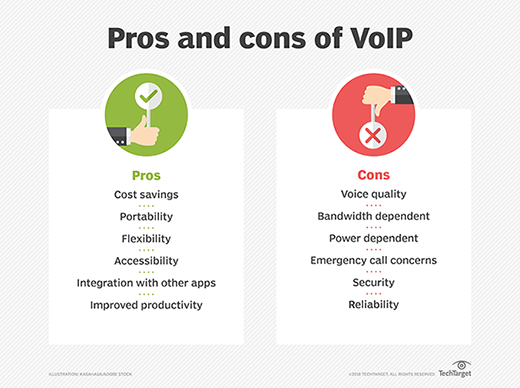
voyager624 - Fotolia
What is the difference between IP telephony and VoIP?
While many IT professionals use VoIP and IP telephony synonymously, some argue for keeping a couple of subtle distinctions between the two terms in mind.
There isn't much substantive difference between VoIP vs. IP telephony, and in fact, many -- if not most -- IT professionals use the two terms interchangeably. Some experts argue, however, that VoIP specifically refers to sending voice traffic over an IP network. In contrast, IP telephony is a broader umbrella term that refers to any telephone-type communication service carried over IP -- this could include faxing, text messaging and more.
Additionally, some analysts note that the term IP telephony most often appears in a business context -- referring to the software and hardware that enables VoIP services -- while VoIP is common in both enterprise and consumer settings.
What is IP telephony?
IP telephony encompasses the technologies, products and services that enable voice calling, voicemail, video calling, video conferencing, faxing, messaging and other telephony-related services using IP's packet-switched connections. Such information traditionally travels over the dedicated circuit-switched connections of the public switched telephone network (PSTN), also known as the plain old telephone service. Instead, IP telephony technology converts calls, faxes and text messages into packets of data that travel across computer network lines, avoiding the tolls of PSTN.
What is VoIP?
Voice over Internet Protocol, or VoIP, is the set of standardized technologies that delivers voice calls via the internet or a private IP-based network. In the narrowest understanding of the term, VoIP is voice over IP only -- a subset of IP telephony that does not include other, non-voice-based communication services, such as faxing or text messaging. But, again, it's generally fine to use the terms VoIP and IP telephony synonymously, as, indeed, many do.

Benefits of IP telephony and VoIP
Before VoIP and IP telephony, the typical enterprise had to deploy and maintain one network for phone calls and another for internet access. With voice and data convergence, an organization needs just one network to deliver both phone services and LAN connectivity.
Benefits of both VoIP and IP telephony include the following:
- lower costs
- streamlined infrastructure
- better scalability
VoIP software, or softphones, also offer users greater mobility, enabling them to make and receive calls across a variety of endpoints -- desktop computers, laptops, smartphones, tablets and standalone devices -- rather than only via fixed lines at their desks.
Challenges of IP telephony and VoIP
An enterprise can deploy VoIP and IP telephony services on premises, as a third-party service via the cloud or in a hybrid model. Regardless, the challenge is to deliver voice, fax, video and text packets in a dependable flow to the user, which depends on internet connectivity. A poor network connection can negatively affect call quality, and an outage will typically bring down the service entirely. Fixed-line telephones, in contrast, should continue to work even during a widespread power outage.



